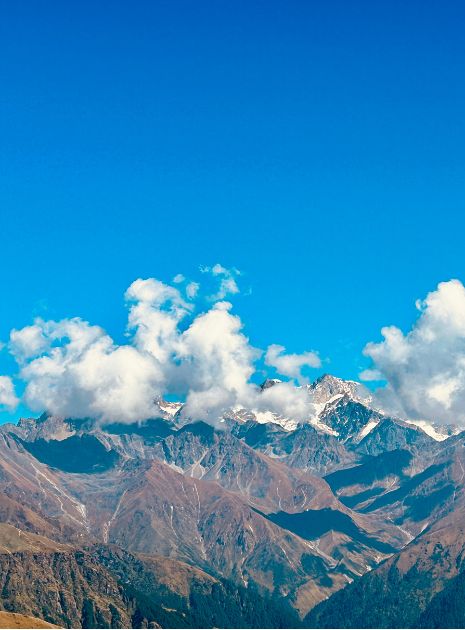Nainbag
There are places in Uttarakhand that feel loud, full of travelers and chatter. Nainbag is not one among them. It sits quietly in Tehri Garhwal (टिहरी गढ़वाल), between ridges and pine forests, breathing gradually and regularly. If you forestall right here for some time, you start to pay attention to the tempo of life—the clink of a water pot, the bleating of goats, the rhythm of tools in terraced fields. Nothing hurries.
There are places in Uttarakhand that feel loud, full of travelers and chatter. Nainbag is not one among them. It sits quietly in Tehri Garhwal (टिहरी गढ़वाल), between ridges and pine forests, breathing gradually and regularly. If you forestall right here for some time, you start to pay attention to the tempo of life the clink of a water pot, the bleating of goats, the rhythm of tools in terraced fields. Nothing hurries.
Nainbag is not just one small metropolis. It is the anchor for plenty villages: Nakot (नकोट), Bhainsari (भैंसारी), Rampur Negiyana (रामपुर नेगियाना), Devan (देवन), Burari (बुराड़ी), Khairada (खैराडा). Each name carries stories.
In Nakot, mornings begin early, with smoke rising from stone houses and women calling children to school. Bhainsari is smaller fields stretch wider than homes. Rampur Negiyana feels lively, with children running down gullies, carrying slates and bags heavier than their shoulders. Devan is quieter, where you hear the wind louder than voices.
Together, these places lean on Nainbag for markets, schools, and buses. Without it, life would feel incomplete.
Morning arrives slowly. The mist curls down the slopes, settling on tin roofs. The air smells of moist earth and pine (चीड़). From someplace, you hear a shepherd’s whistle, sharp and clear, guiding goats up the hill. Women deliver brass pots (घड़ा) balanced on their heads, their steps constant even at the slim stone trails.
Men stroll with sickles (दरांती), equipment over their shoulders, speaking in low voices about the day’s paintings.
By midday, the small bazaar wakes up. Shops open shutters with a bang. Rice sacks stand piled in corners, jars of toffees catch kids’ eyes. Someone fries jalebi (जलेबी) in warm oil, the odor pulling humans closer. Farmers gather, arguing lightly about the fee of mandua (मंडुवा). Neighbors forestall for tea at stalls, catching up on weddings, harvests, and who fell unwell last week.
Evenings are softer. Smoke rises from every rooftop. The air fills with the scent of dal (दाल), bubbling and rotis puffing on the chulha (चूल्हा). Children study by using lantern light, their voices stumbling over English phrases. Elders sit outside, sipping tea in steel glasses, talking about old times when roads were fewer and walking was the only way.
By night, silence spreads. Only the wind and a dog’s bark remind you that life hasn’t fully gone to sleep.
In Nainbag, seasons decide everything.
Seasons don’t just decorate the land. They guide when to sow, when to harvest, and even when to hold weddings.
The kitchens here are earthy. Aloo ke gutke (आलू के गुटके), spiced with jakhya (जाख्या), make fingers lick-worthy. Mandua rotis with a dollop of ghee taste like strength after a day in the field. Kafuli (कफुली), a curry of green leaves, simmers slowly, thick and warm. Bhatt ki dal (भट्ट की दाल) has a smoky depth, especially when eaten with rice fresh from the fields.
Food here is not for show. It is born from soil, fire, and care. Sitting on a kitchen floor, you realize meals are less about recipes, more about survival with love.
Education walks slowly but surely through Nainbag. Small schools and colleges gather children from all nearby villages. Girls in blue uniforms walk miles, braids swinging as they climb uphill paths. Teachers, some from Dehradun or Tehri, ride buses that shake on rough roads, yet they come. Parents speak softly: “हम चाहते हैं कि बच्चे सीखें, पर गाँव से न टूटें।”
The roads are thin, curling like snakes. Buses honk, carrying people to Tehri, Rishikesh, and Dehradun. Monsoon brings slips and blocks, but no one gives up. People wait, people walk, people share jeeps when they have to.
Temples stand quietly, flags (झंडे) fluttering against blue skies. Bells (घंटी) echo across valleys. Festivals brighten the lanes Diwali brings rows of diyas (दीये), Holi throws colors, and Navratri fills nights with songs.
The fairs (मेले) are special. Villagers walk miles, carrying children on their shoulders. Stalls sell wooden toys, bangles, and cheap plastic whistles. Elders sip tea under makeshift roofs, watching the crowd. For one day, everyone is together, laughter louder than worries.
Nainbag doesn’t dazzle. It seeps into you. It is in the smell of pine resin after rain. In the sound of goats returning home at dusk. In the sight of women threshing grain under the sun. In the warmth of tea shared with strangers who stop being strangers in minutes.
Travelers often say Nainbag isn’t a “spot to see.” It’s a pause. A reminder of what life feels like when it isn’t rushed.
On paper, Nainbag is just a tehsil in Tehri Garhwal. On the ground, it is breath and bond, soil and story.
To know Nainbag is to sit by a fire on a winter night, to eat mandua roti with your hands, to listen as elders tell of days before roads and electricity. It is to feel how life continues, gently, without hurry.
Nainbag (नैनबाग) is not a destination. It is a way of belonging to the hills.
| All Sub Districts | ||
|---|---|---|
| Dhanaulti | Gaja | Kandisaur |
| Kirtinagar | Madannegi | Nainbag |
| Pawki Devi | Pratapnagar | Narendranagar |

Uttarakhand is not simply another country. People here name it Devbhoomi (देवभूमि), the Land of the Gods. And it feels that way. Rivers begin right he......
See Details